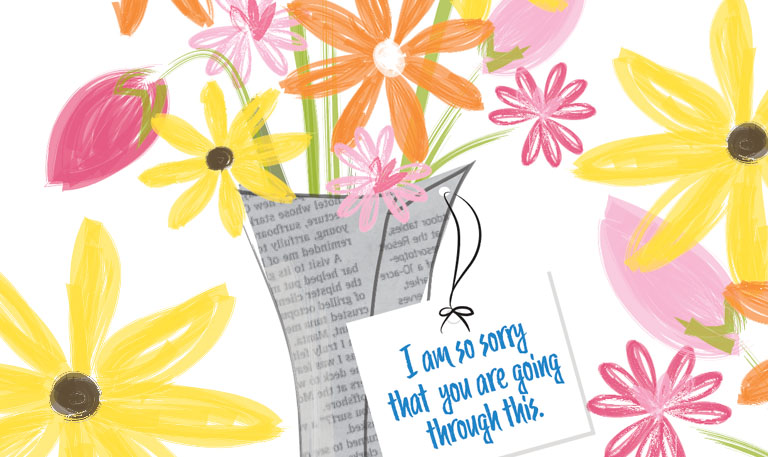Have you ever felt as if you didn’t know what to do or say to someone dealing with a difficult situation whether they are a patient, a caregiver, or a survivor of a tragic loss? You are not alone. Before I lost my husband to cancer, I always feared that I would say or do the wrong thing. Despite my heartfelt intentions, I often fumbled for words and was at a real loss on how to truly help those in distress.
Now that I am on the other side, I have gleaned much from my journey of what’s helpful and what’s not. I got very tired of hearing the platitude, “Our thoughts and prayers are with you.” While I’m sure the sentiment is sincere, it just seems so empty. This is also true for the single obligatory get well or sympathy card. Don’t send just one, send one a week or a month for as long as needed.
The other common refrain that made me weary was, “Let me know if there is anything you need.” This puts the burden back on the one who is just trying to get through each day. As I told my stepson following this offer, “I am so overwrought that I have no idea what I need.” He showed up the next day with a pressure washer and cleaned all the walkways around the house. This is a great example of how to really help. There are so many things that you can just do—weed the garden, clean out the fridge, mow the lawn, drop off a bouquet of flowers, a good book, or a favorite treat like a latte. And instead of saying, “Can I bring you a meal? Say “Can I bring you a meal on Tuesday or Friday?”
Just sitting—even holding the hand of someone who is suffering—is very powerful. Your presence may be all that is needed. If words are important, the best message is a simple, “I am so sorry that you are going through this.” Don’t tiptoe around the situation by saying unhelpful things like “you are looking good,” or suggesting some new treatment you’ve read about. It is not helpful to pretend that everything will be OK if you have no way of knowing that. I also recommend keeping any visit short—15 to 20 minutes is plenty, and the brevity is often a relief to those involved.
An important “do” after someone close to you has lost a loved one is to continue to check on them frequently for at least the first year. Mark the death anniversary on your calendar and reach out on that day. Although many people feel they need to avoid mentioning the deceased, I welcomed the chance to talk and reminisce about my husband. Finally, if you send a sympathy card, don’t just sign your name but include some fond remembrance of the person. And it is especially comforting to hear, “You were a wonderful daughter, wife etc.” during this time of sorrow.
Marilee Clarke lives in Issaquah and loves the Northwest’s natural beauty. She is a collage artist, and her passions include travel and anything creative. She and her late husband taught a course at Bellevue College on “How to get the most out of your retirement years” and that is just what she’s doing!


